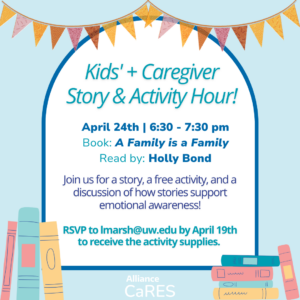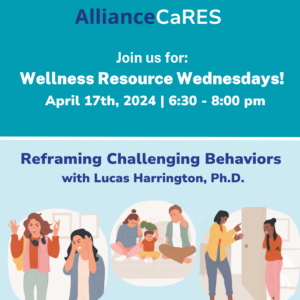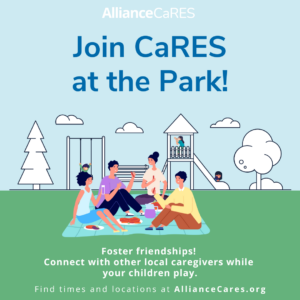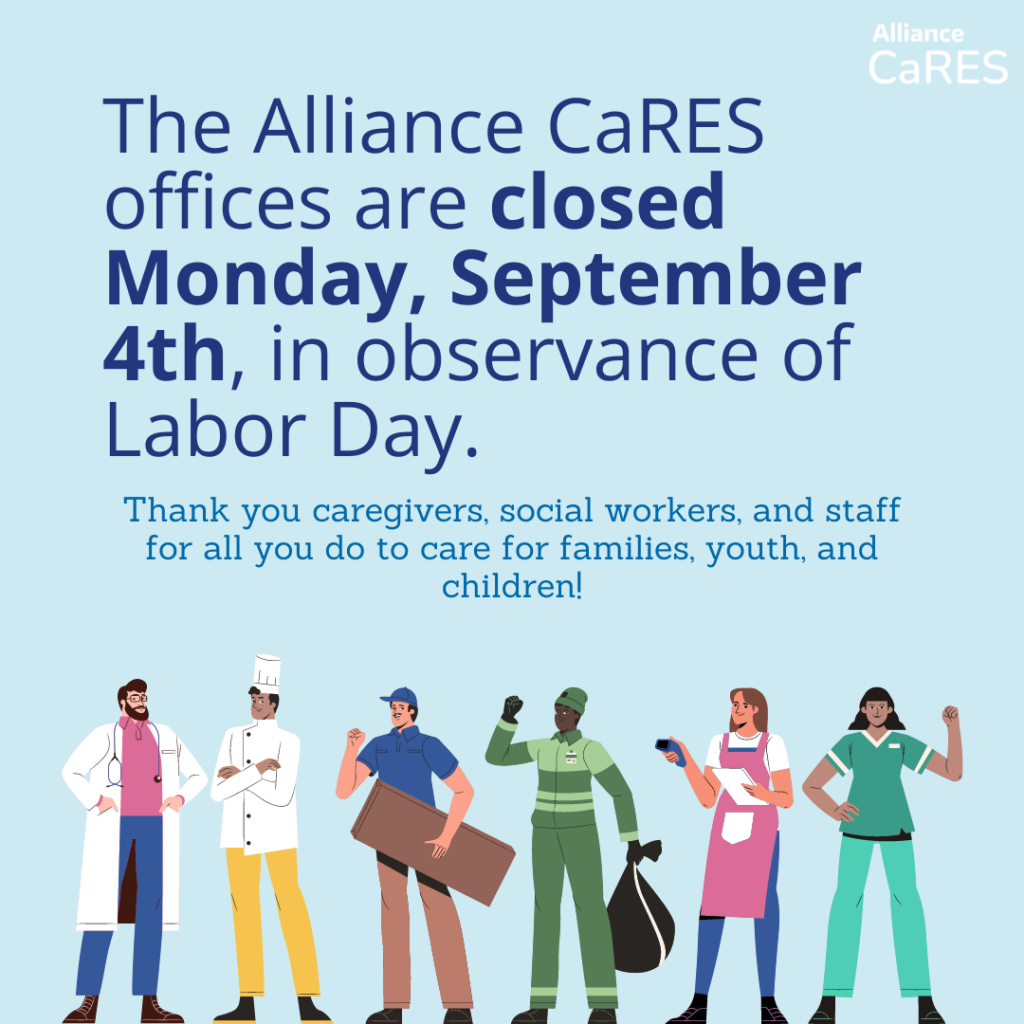Support Groups
Connect with others who "just get it"!
We also offer robust learning opportunities through the The Alliance for Professional Development, Training, and Caregiver Excellence, such as trainings and individual support sessions. We are here to answer your questions and offer help when you need it!

Topic Support Groups
We know caregivers feel successful in their journey when they are connected to other caregivers. That is why Alliance CaRES is in the community to help you come together with other local foster and kinship families to share common challenges, feel heard, and solve problems.
Instructional video on Creating a New Account, Logging In, and Resetting Your Password for the Alliance Catalog. You can access a transcript in the right column of the page that will follow along with the video. If you still need help after watching the videos, please feel free to reach out to us at AllianceSupport@uw.edu.
Dancing with a Porcupine: The CaRES team leads you through a reading and discussion of “Dancing with a Porcupine” by Jennie Owens. This book shares the compelling story of the author’s struggle to save her own life while caring for three children she and her husband adopted from foster care.
During the three sessions, you will discuss themes including: self-care; trauma-informed care; expectations and hurt feelings; compassion fatigue; and balancing real life with the outside pressure to look like you are doing it all well. Register here!
FASD Trying Differently Rather Than Harder: The CaRES team leads you through a reading and discussion of “Trying Differently Rather Than Harder: Fetal Alcohol Spectrum Disorders” by Diane Malbin. This book is a readable, narrative discussion of the neurobehavioral approach to working with children and youth with FASD. The book focuses on understanding behaviors differently through case studies and examples of how FASD impacts everyday life.
During four sessions, you will be discussing themes including: adaptions, common challenges, cognitive changes and strategies to address them, working with memory disruptions, and talking about FASD in a supportive informative manner. Register here!
TBRI: The Connected Child: The CaRES team will be leading a group through reading and discussion of “The Connected Child,” by Karyn Purvis.
“The Connected Child” lays out the foundational principles for Trust Based Relational Intervention (TBRI), a therapeutic model that trains caregivers to provide effective support and treatment for at-risk children.
Discussion at the four weekly book club meetings will dive into what TBRI is, and discussion will include a look at new strategies for building connection and managing behaviors.
So you can fully participate in the class, please have access to a copy of the book. You can find “The Connected Child” on Amazon, at your local library or at local retailers. Register here!
TBRI The Connected Parent: Join us for another TBRI book club! “The Connected Parent,” by Karyn Purvis and Lisa Qualls is the companion book to the widely popular, “The Connected Child.”
Discussions during the four weekly book club meetings will review TBRI principals and dive into practical parenting applications and real life strategies for understanding attachment, teaching respect, understanding sensory needs, adapting strategies for teens, and taking care of yourself.
So you can fully participate in the class, please have access to a copy of the book. You can find “The Connected Parent” on Amazon, at your local library or at local retailers. Register here!
TBRI Connected Therapist Book Club, Relating Through the Senses: This 3-week book club is an extension of the Trust Based Relational Intervention (TBRI) modules or the TBRI book clubs: The Connected Child and The Connected Parent. Based on selections from “The Connected Therapist” by Marti Smith, discussions during the three sessions will focus on understanding sensory processing challenges, developing sensory processing strategies, and the practical application of those strategies in everyday caregiving.
This TBRI book club is an encouraging and welcoming space for foster parents and kinship caregivers to engage in a next step in peer-to-peer support, problem-solving, and learning facilitated by a TBRI practitioner.
Caregivers who have completed either both TBRI book clubs or the TBRI modules can register. Register here!
Caregiver Strategies for Holidays and Celebrations: Holidays and celebrations can be a time of family togetherness, but they can also be a time of stress and heightened expectations. It takes intentional planning to give the children in your care a wonderful experience that includes the things that make the holiday or celebration special for everyone.
In this 2-hour supportive facilitated discussion, kinship and foster caregivers will talk with each other about ways to manage the expectations of the child, their family, and your family. You will also talk about how to plan ahead to minimize the emotional challenges that sometimes come with family celebrations. Lastly, you will have an opportunity to create a celebration action-plan that is specific to your family and the child in your home. Register here!
Fostering Across Race, Ethnicity, and Culture: Welcoming a child into your home, even temporarily, means accepting and affirming their whole selves. When a child has a different racial, ethnic, or cultural background than yours, it can be challenging to know the best ways to properly care for their unique physical, spiritual, and cultural needs.
During this facilitated discussion, caregivers will share their racial, ethnic, or cultural perspective and develop strategies for meeting the needs of a child who has a different background or perspective. The discussion will also include some tips and tricks for finding resources, maintaining community connections, and addressing biases in the community.
Facilitated by caregivers with lived experience in transracial and multi-cultural caregiving, this group aims to discuss the full scope of multi-racial, ethnic, and cultural foster families. Register here!
Fostering While Parenting, Supporting Our Biological and Adopted Children: When you have children who live at home with you, becoming a foster parent also means becoming a foster family. Growing up with foster siblings comes with unique challenges but there are strategies you can use to help your bio and adopted kids adapt and thrive!
During both sessions of this supportive facilitated discussion, you will collaborate with fellow caregivers to identify some of the unique challenges bio and adopted kids face, consider the impact fostering may have on your children, and share strategies you can use to nurture strength and resilience as a family unit. Register here!
Using Storytime for Connection and Support: Reading with your children can do much more than support their academic growth! During this supportive facilitated discussion caregivers will discuss strategies they can use before, during, and after reading to build social-emotional learning with the children in their care. Caregivers will also collaborate to identify techniques they can use to increase attachment with their child through reading and story time. Whether it is picture books, a chapter book or a series, reading with the children in your home can lead to deeper attachment and improved social-emotional skills!
Participants will also receive a pdf resource with book lists for various age ranges and topics. Register here!
Supportive Facilitated Discussion Group: Navegando el Cuidado de Crianza Como un Cuidador de Habla Hispana:
¿Alguna vez ha sentido que su cultura latino/a/x e idioma impacta su experiencia como padre de crianza?
En este grupo de discusión facilitada de apoyo solo para hispanohablantes, tendrá la oportunidad de hablar con otros padres de crianza y parientes como proveedores de cuidados sobre sus experiencias y compartir las suyas. Como grupo, hablarán sobre herramientas y técnicas útiles para navegar por los problemas comunes que enfrentan los cuidadores de habla hispana y utilizarlas para desarrollar estrategias específicamente para su familia.
Esta discusión facilitada de una sola sesión es específicamente para parientes y padres de crianza que consideran el español como su idioma principal. La discusión se lleva a cabo en español y es facilitada por hablantes nativos de español. ¡Registrate aquí!
Supporting LGBTQIA+ Youth in Foster Care: Understanding your child’s identity is critical to providing them the care and support they need to navigate the development years. Children with an LGBTQIA+ identity may need additional support as they navigate extra social and cultural factors. In this supportive facilitated discussion group, you will have an opportunity to talk through LGBTQIA+ terminology and identify concrete tools you can use to support a child’s LGBTQIA+ identity.
During the two facilitated discussion sessions, you can ask questions about support resources, share ways you have supported a child in your care, and hear how other caregivers have navigated situations related to a child’s LGBTQIA+ identity. Register here!
Navigating Fostering as a LGBTQIA+ Caregiver: As an LGBTQIA+ caregiver have you felt that your Sexual Orientation, Gender Identity and Expression (SOGIE) impacts your fostering journey?
In this supportive facilitated discussion group, you will get a chance to talk with other LGBTQIA+ kinship and foster caregivers about their experiences and share your own. As a group, you will talk about useful tools and techniques for navigating common issues faced by LGBTIA+ caregivers and use these to develop strategies specifically for your family.
This single session facilitated discussion is specifically for kinship and foster caregivers who identify as LGBTQIA+ caring for children with any SOGIE. Register Here!
Caring for Drug Impacted Infants and Children: This facilitated discussion group is open to all caregivers of infants and children but was designed to follow the Alliance courses, “As They Grow: The Drug Impacted Infant and Toddler/Child” During this facilitated discussion, you will consider the signs of withdrawals in infants; what works best in caring for an impacted infant including therapeutic handling techniques and resources. You will also discuss issues, behaviors, interventions, effective parenting techniques, and resources for the children in your care. Register here!
Littlest Lives and Their Big Needs – Parenting 0 to 2: As a parent of an infant or toddler, the earliest development years are among the most critical to a child’s long-term development. Children under 2 who are in foster care often require supports and approaches that are not so typical for their peers. You will talk through their needs, develop strategies to address those needs, and identify the resources available to help you support the littlest lives in care. You will also be able to build community with other caregivers of kids under 2 to share resources, experiences and problem-solving strategies. Register here!
Parenting in the Digital Age: Ready access to smart phones, tablets, and computers has created a whole new world of challenges for parents of pre-teens and teens. Youth do not need to leave their bedrooms to be introduced to risky situations. And it is challenging for caregivers to know how to guide children to appropriate use while keeping them safe.
During this single session supportive facilitated group, you will talk with fellow caregivers about the challenges of parenting in the digital age. You will learn some warning signs when a child’s internet usage has become unsafe and potentially dangerous. You will discuss basic internet programs, apps, geo tracking data, dangers in sharing pictures, videos, and personal information online. And you will have the opportunity to practice having a conversation about internet safety with your pre-teen or teen. Register here!
Parenting Teens: This facilitated discussion group is a continuation of the seven-part “Parenting Teens” webinar. This group will continue to explore strategies for parenting teens with a history of trauma, developing healthy and supportive relationships with your teen, nurturing their identity, and understanding their challenging behaviors. You’ll work with other parents of teens to develop an action plan that takes into account your and your teen’s unique circumstances and proactively addresses the challenges you face. Register here!
Practical Parenting Skills for Caregivers: It isn’t always easy to meet the complex needs of a child while navigating a new parental role. Foster parenting calls for a trauma-informed, mindful, and positive response to a wide variety of behaviors. You will work with fellow caregivers to develop practical parenting strategies that are trauma-informed, appropriate for the child, and suited to your home. Register here!
Grief and Loss in Your Fostering Journey: As a caregiver for a child in the foster care system, grief and loss are an inherent part of your journey. You may be grieving a placement that isn’t going as expected or hoped. Even as you celebrate a child’s return home or to an adoptive placement, your family may be grieving the loss of a child or experiencing a sense of loss due to a disrupted placement.
During this supportive facilitated discussion, we will talk about the realities of grief and loss as they relate to the fostering experience. We will share strategies for recognizing grief in yourself, partner, or your children. And we will look at ways to acknowledge the complexities of loss, navigate grief, and share healthy strategies for walking through the grieving process. Register here!
Self-Care for Caregivers: The very best thing you can do for those who depend on you is to take care of yourself. This group will engage in conversations around how to make sure you see how valuable your contribution is, as well as also how demanding it can be. You can talk about challenges you’re facing when thinking about self-care, because real life does sometimes make it hard to prioritize. You’ll work toward developing an action plan that takes into account your unique circumstances and proactively addresses things that might derail your self-supporting activities. Register here!
Boundaries As Self-Care: As a caregiver, the very best thing you can do for those who depend on you is to take care of yourself. This group is an extension of the topic support group “Self Care for Caregivers.”
In this group, you will engage in conversations around how to make sure you see how setting and keeping healthy boundaries allows you to continue doing the valuable work you do while protecting your important relationships. You can talk about challenges you’re facing when thinking about boundaries, because real life sometimes makes it hard to say no or hold to your priorities.
You’ll work toward developing an action plan that takes into account your unique circumstances and proactively addresses things that might make it hard to maintain your identified healthy boundaries. Register here!
Fostering as Part of a Team: As a caregiver for a child in the foster care system, you are part of a parenting team. The courts, social worker, CASA, GAL, medical team, therapists and the child’s biological family all have a role to play. Knowing what your role is and how to partner with the other member of the child’s team improves the child’s care, your experience as a foster parent, and the long-term outcomes of the placement.
During the three sessions, we will talk about who the members of the child’s foster care team are and their roles, and identify ways to promote positive relationships with them. This will include a look at how to support family time and partnership with the biological/first family, understanding the role of DCYF staff, and how to positively partner with them for placement success. You will also identify the opportunities and limitations of the caregiver role in decision-making and planning. Register here!
Special Events
Education Resource Wednesday
Wednesday, March 20 from 6:30 – 8:00 p.m.

Join us via Zoom from 6:30-8 p.m. on Wednesday, March 20th for Educational Resource Wednesday: Equitable Access to Education for Black, Indigenous, and Students of Color.
Speakers: Terri Awoko, DCYF Foster Care Education Program Manager, and Luanne Marshall, CaRES Specialized Support Coordinator
Understanding the experiences of “BIPOC” (Black, Indigenous, or person of color) students is crucial for developing a more inclusive, equitable, and supportive educational environment for all students. Join us on March 20th in discussing practices for a more inclusive culture of education.
Register Here: Topic Support Group: Education Resource Wednesday.
Education Resource Wednesdays are a collaboration between Treehouse, DCYF, Office of the Superintendent of Public Instruction, and Alliance CaRES.
 Kids’ and Caregiver Story Time and Craft
Kids’ and Caregiver Story Time and Craft
Wednesday, April 24 from 6:30 – 7:30 p.m.
Is your child aware of the fact that they are not the only child in their world with multiple parents?
Join us for story time as we read about what makes each child’s family special. We will be reading the books: “A Family is a Family” by Sara O’Leary and “My Family, Your Family our Families (How Are We Alike and Different)” by Emma Carlson Berne. Our craft for the night will be making/coloring family member figures.
To register, please email CaRES Team Member Luanne at lmarsh3@uw.edu with your child’s name/s and address by April 19th for the craft supplies.
This event is open to Washington State foster and kinship families with a child in your care. If you have an eligible foster youth, all children in your household can join.
CaRES Special Events
Pathways to Licensing and Support for Kinship Caregivers
Tuesday, April 9 from 6:30 – 8:30 p.m.
Speaker: Renatta Watson, DCYF Foster Care and Kinship Licensing Initiatives Manager
Join us to learn more about why Kinship Caregivers are important in the placement of related children and youth entering the system and what resources are available to support you as the Kinship provider.
Register Here: CaRES Special Events: Caregivers – 04/09/24 – Webinar | UW School of Social Work Professional Education
Interstate Compact on the Placement of Children
Tuesday, April 23 from 6:00 – 8:00 p.m.
Speaker: Shannon Freeman, ICPC Deputy Compact Administrator
The Interstate Compact on the Placement of Children (ICPC) is a law for all 50 states, the District of Columbia, and the U.S. Virgin Islands. It sets clear rules and responsibilities for those placing children with a caregiver in another state. Come learn more about the ICPC courtesy supervision process.
Register Here: CaRES Special Events: Caregivers – 04/23/24 – Webinar | UW School of Social Work Professional Education
 Wellness Resource Wednesday: Reframing Challenging Behaviors
Wellness Resource Wednesday: Reframing Challenging Behaviors
Wednesday, April 17 from 6:30 – 8:00 p.m.
This month’s Education Resource Wednesday will cover “Equitable Access to Education for Black, Indigenous and Students of Color.”
Do you have a child that “doesn’t fit the mold”? University of Washington Autism Center psychologist and parent/caregiver coach Lucas Harrington, PsyD will talk about his favorite tools and resources for supporting children who don’t fit the mold. Instead of power struggling for compliance, adults can learn to be the trusted authority that young people turn to for help in bringing out their best selves.
You can sign up for this course at Topic Support Group: Wellness Resource Wednesday | UW School of Social Work Professional Education
On alternating months, please consider our Education Resource sessions. Topic Support Group: Education Resource Wednesday | UW School of Social Work Professional Education
Education Resource Wednesday
- Education Resource Wednesday: Equitable Access to Education for LGBTQIA2S+ Students (1/17/24)
- Understanding, Accessing, and Supporting Special Education Services (5/17/23)
- Addressing Challenging Student Behavior
- Post-Secondary Resources for Education & Career Planning
- Supporting the Academic Success of Your Student (11/16/22)
- Educational Stability for Students in Foster Care (9/23/22)
Special Events
- Promoting Physical Health for Children in Foster Care (3/5/24)
- Guardianship & Adoption (2/20/24)
- Informational Session on Opioids, Fentanyl, and Narcan (11/1/23)
- Adoption Support Services
Wellness Resource Wednesday
- ADHD and the Trauma Brain (2/21/24)
- Sensory Processing Differences (12/20/23)
- Fatigue and Burnout (10/18/23)
- What Caregivers Need to know about Sleep (12/21/22)
- Fetal Alcohol Spectrum Disorders (FASD) (8/17/22)
- What Caregivers Need to know about Nutrition and Diabetes (6/15/22)
- What Caregivers Need to know about Asthma (4/20/22)
- ADHD in Foster Care (2/16/22)
Drop-In Discussions
Drop-In groups provide a chance for caregivers to connect with each other online for support and resources informally. Sometimes you just need to have a conversation with someone else who “gets it”. As Drop-In groups are not specific trainings and have no curriculum, they do not qualify for training credit.
It’s All Relative: Kinship Support Drop by for kinship resources, help with licensing, and answers to your kinship questions.
First Thursday from 7:00 – 8:00 pm Click here to join the Zoom session.
TBRI Tuesday: Dive in and discuss parenting challenges using Trust Based Relational Intervention principles! Gather with other caregivers as we discuss how to connect, empower, and correct children the TBRI way.
* There is no need to have completed a TBRI training to attend this group, just come and learn more! 2 hours of training credit is available for this group.
- Tuesday, April 9, 2024, 6:30 – 8:30 p.m. – Topic: Supporting Child Mental Health with TBRI Principles
- Tuesday, July 9, 2024, 6:30 – 8:30 p.m. – Topic: Addressing Child/Youth Hygiene Issues with TBRI Principles
- Tuesday, October 8, 2024, 6:30 – 8:30 p.m. – Topic: Sensory Integration and TBRI Troubleshoot Session
Join our April 9th session on Zoom: https://us02web.zoom.us/j/89347888148
What can I share with the group? Will my social worker or licensor know I attended this group? Will I receive training credit for attending? Find the answer to these and other questions by clicking here and reading the Drop-In Group FAQ.
In-Person Community Groups
 Community groups are a great way for foster parents, relatives, and kinship caregivers to meet one another in a safe and supportive environment. Hosted by a CaRES Community Connector (who are all caregivers themselves), these regular groups offer the opportunity to gain support, expand your network and resources, and spend time with those who “get it.” You might even leave with a connection to a mentor or for respite!
Community groups are a great way for foster parents, relatives, and kinship caregivers to meet one another in a safe and supportive environment. Hosted by a CaRES Community Connector (who are all caregivers themselves), these regular groups offer the opportunity to gain support, expand your network and resources, and spend time with those who “get it.” You might even leave with a connection to a mentor or for respite!
Some community groups meet monthly over a meal while others meet up for a local activity or event. Don’t see one listed in your community? Reach out to us to learn if we can point you to another organization or work with you to build one.

